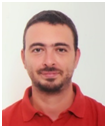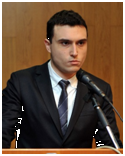Courses
The Digital Transformation and the New Perspectives for Planning and Management of Aqueducts: the role of the digital twins
Course Leader
Orazio Giustolisi, Politecnico di Bari, Italy. Send e-mail.
Course instructors

Luigi Berardi
Luigi Berardi is Full Professor in Hydraulic Engineering at Engineering and Geology Department of University “G. d’Annunzio” of Chieti Pescara (Italy). In 2005-2006 he was Visiting Researcher at the Center for Water Systems, University of Exeter (UK); in 2009 he got a PhD in Civil and Environmental Engineering and in 2010-2018 he was Research Fellow at Polytechnic of Bari (Italy). His main area of expertise is the analysis and asset management of water distribution networks (WDN) including: advanced hydraulic modelling and calibration; development of metrics for optimal WDN segmentation and DMA design; strategies to support optimal operation of pressure control devices; analysis of WDN vulnerability; optimal planning of rehabilitation; water losses management. In the area of hydroinformatics He worked on developing data-modeling techniques used for water infrastructure management (Multi-objective Evolutionary Polynomial Regression; Multi-objective Artificial Neural Networks). He is the author of about 120 scientific papers, of which about 35 in international scientific journals, cited about 1200 times (h-index 19) (source Scopus).

Daniele Laucelli
Daniele B. Laucelli is Associate Professor in Hydraulic Engineering at Department of Civil, Environmental, Land, Building Engineering and Chemistry (DICATECh) of Technical University of Bari (Italy). In 2005 he got a PhD in Environmental Engineering and in 2006-2008 he was Research Fellow at Technical University of Bari (Italy). In 2007-2010 he was Honorary Researcher at the Center for Water Systems, University of Exeter (UK). His first research interest was in the area of Hydroinformatics, working on developing data-modeling techniques used for water infrastructure management (Multi-objective Evolutionary Polynomial Regression; Multi-objective Artificial Neural Networks). Currently, his main area of research is the analysis, design and management of water distribution networks including: network simulation models, reliability analysis, pumping optimization; rehabilitation planning and leakage management, complex network theory applied to DMA design and network monitoring. He is the author of about 130 scientific articles, of which about 40 in international scientific journals, cited about 1300 times (h-index 20) (source Scopus).

Francesco G. Ciliberti
Francesco G. Ciliberti received his M.S. in Environmental Engineering from the University of Calabria in 2017. Currently, he is a PhD student at Engineering and Geology Department of University “G. d’Annunzio” of Chieti Pescara (Italy). Prior to joining D’Annunzio University in 2020, He worked as a research fellow in the Department of Civil Engineering and Architecture (DICAR) at the Technical University of Bari (Italy) for the execution of research activities within the INTERREG GRE-ITA project “SUstaiNable WATER supply networks in Mediterranean touristic areas” (SUNWATER), since 2018. His research focus on the development of methodologies and tools for reliable Water Distribution Networks (WDNs) management, including the application of the Digital Transformations concept for supporting technicians and water utilities in solving Water Distribution Networks life-cycle management tasks. His research includes advanced hydraulic modeling of water systems, Complex Network Analysis of Water Distribution Networks, GIS-based software services and solutions development.
Short Description
Water systems require rational, replicable, integrable and flexible methodologies to deal with the classic and new activities of analysis, planning and management to improve the socio-economic and financial sustainability of the works for the community.
Today we are witnessing an exciting technical-scientific era called digital transformation. There is no clear consensus to date on the true meaning of digital transformation, but the results will generate it. In addition, the concepts and paradigms underlying digital transformation such as data science, evolutionary optimization, genetic programming, the theory of complex networks, digital twins, etc. they were developed during the last century, even several decades ago, and some theories during the previous centuries.
Nonetheless, the new needs of planning and sustainable management of water systems are today supported by the technical-scientific research of the last two decades and by the change of pace that information and communication technologies, the increase in computational and storage capacities of computers, geographic information systems, etc. have introduced with respect to the practical application of the concepts and paradigms underlying the digital transformation already imagined during the last century.
Today it is therefore possible to plan and manage water systems in an increasingly rational and efficient way by integrating the tools and concepts of digital transformation if we always remember to be on the shoulders of the giants of science and technic of the past centuries. Therefore, the presentation will discuss in the first part the meaning of digital transformation, with reference to water systems, and which are the drivers also through a brief discussion of its origins and trends. For this reason, the historical events of the birth of some paradigms and tools will be reviewed.
Afterwards, the presentation will show the applications of the concepts of digital transformation to real cases of modeling and planning for the Acquedotto Pugliese water company to discuss the integration of advanced hydraulic modelling with digital transformation components to obtain system digital twins. Several digital twins will be shown to discuss the concept of service for analysis, design and management activities.
Target Audience
This course is generally delivered in Italy to water managers and hydraulic modellers. In any case, it will be profiled according to the audience.
